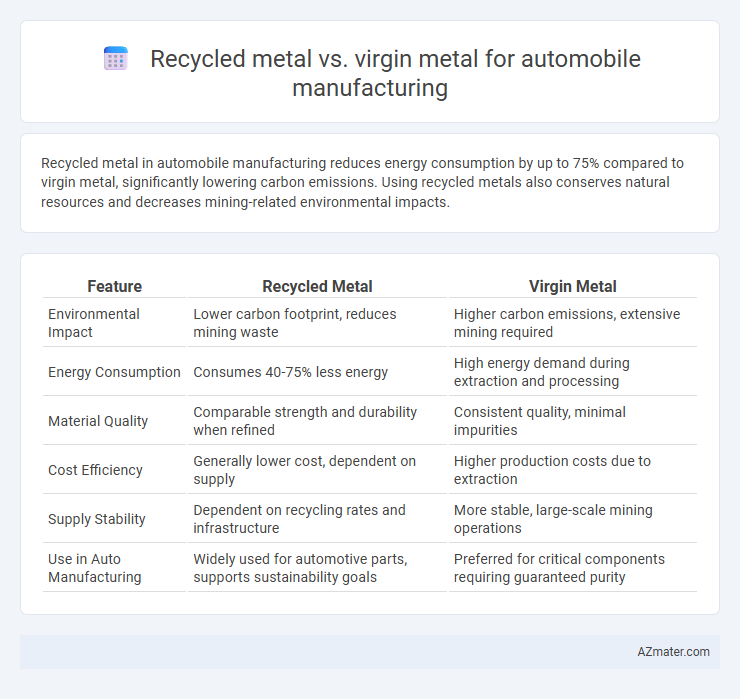Recycled metal in automobile manufacturing reduces energy consumption by up to 75% compared to virgin metal, significantly lowering carbon emissions. Using recycled metals also conserves natural resources and decreases mining-related environmental impacts.
Table of Comparison
| Feature | Recycled Metal | Virgin Metal |
|---|---|---|
| Environmental Impact | Lower carbon footprint, reduces mining waste | Higher carbon emissions, extensive mining required |
| Energy Consumption | Consumes 40-75% less energy | High energy demand during extraction and processing |
| Material Quality | Comparable strength and durability when refined | Consistent quality, minimal impurities |
| Cost Efficiency | Generally lower cost, dependent on supply | Higher production costs due to extraction |
| Supply Stability | Dependent on recycling rates and infrastructure | More stable, large-scale mining operations |
| Use in Auto Manufacturing | Widely used for automotive parts, supports sustainability goals | Preferred for critical components requiring guaranteed purity |
Introduction to Metals in Automobile Manufacturing
Automobile manufacturing relies heavily on metals such as steel, aluminum, and copper, which provide essential strength, durability, and conductivity for vehicle components. Virgin metals, extracted directly from ores, offer high purity and consistent mechanical properties crucial for structural integrity and safety standards. Recycled metals reduce environmental impact and energy consumption during production but require advanced processing to match the quality and performance benchmarks set by virgin materials.
Overview of Recycled vs Virgin Metals
Recycled metal in automobile manufacturing offers substantial energy savings, reducing carbon emissions by up to 90% compared to virgin metal extraction. Virgin metals, derived from mining and raw ore processing, provide consistent material quality essential for structural integrity but involve higher environmental impacts and resource depletion. Choosing recycled metals supports sustainable production by minimizing waste and conserving natural resources while maintaining the performance standards critical for vehicle safety and durability.
Environmental Impact: Recycled Metal vs Virgin Metal
Recycled metal in automobile manufacturing significantly reduces environmental impact by lowering energy consumption and greenhouse gas emissions compared to virgin metal production, which involves extensive mining and processing. The use of recycled metals decreases the demand for raw material extraction, minimizing habitat destruction and soil erosion. Recycling metals also conserves natural resources and reduces landfill waste, resulting in a more sustainable and eco-friendly automotive industry.
Cost Analysis of Recycled and Virgin Metals
Recycled metals significantly reduce material costs in automobile manufacturing by lowering energy consumption and raw material expenses compared to virgin metals. The production of recycled aluminum uses up to 95% less energy, translating to cost savings of approximately 40-50% per ton versus virgin aluminum. While virgin metals offer consistent quality and supply, the economic advantages of recycled metals make them increasingly attractive for automakers seeking sustainable cost efficiency.
Mechanical Properties and Performance Comparison
Recycled metal in automobile manufacturing often exhibits mechanical properties comparable to virgin metal, including tensile strength and hardness, essential for structural integrity and safety. Performance tests reveal recycled metals maintain durability and corrosion resistance, critical for long-term vehicle reliability and reduced maintenance costs. Utilizing recycled metals also promotes sustainability by conserving natural resources and lowering the carbon footprint without compromising automotive quality or performance standards.
Energy Consumption and Carbon Footprint
Recycled metal in automobile manufacturing reduces energy consumption by up to 70% compared to virgin metal production, significantly lowering carbon emissions. Utilizing recycled aluminum and steel cuts carbon footprints by approximately 40-50%, contributing to more sustainable vehicle production. Automakers adopting recycled metals benefit from reduced environmental impact and align with global carbon reduction targets.
Supply Chain and Material Availability
Recycled metal significantly reduces dependency on mining, enhancing supply chain resilience and lowering raw material volatility in automobile manufacturing. Virgin metal extraction faces challenges such as longer lead times and environmental regulations, impacting material availability and cost stability. Integrating recycled metal streamlines procurement processes, supports circular economy practices, and ensures a more consistent supply of critical alloys for automotive components.
Regulatory Standards and Certifications
Recycled metal in automobile manufacturing meets stringent regulatory standards such as ISO 9001 for quality management and ISO 14001 for environmental management, facilitating compliance with automotive industry requirements like IATF 16949. Virgin metal often undergoes certifications ensuring purity and mechanical properties as per ASTM and SAE standards, critical for safety and performance in vehicle components. Regulatory bodies increasingly favor recycled metals due to their lower environmental impact, promoting certifications that verify responsible sourcing and reduced carbon footprint.
Case Studies from Leading Automobile Manufacturers
Leading automobile manufacturers such as Ford and BMW have demonstrated significant environmental and cost benefits by integrating recycled metals in their vehicle production, reducing carbon emissions by up to 40% compared to virgin metal usage. Case studies reveal that recycled aluminum and steel maintain structural integrity while cutting energy consumption during manufacturing by nearly 60%. These findings affirm the potential for increased adoption of recycled metals to enhance sustainability without compromising vehicle performance.
Future Trends in Sustainable Automotive Metals
Recycled metals offer significant environmental benefits by reducing energy consumption by up to 75% compared to virgin metal extraction, making them a pivotal choice in sustainable automobile manufacturing. Advances in metal recovery technologies and circular economy initiatives are driving increased adoption of recycled aluminum and steel, which maintain performance standards while lowering carbon footprints. Future trends indicate a shift toward integrating high-strength recycled metals with lightweight design innovations to meet stricter emissions regulations and enhance vehicle efficiency.

Infographic: Recycled metal vs Virgin metal for Automobile manufacturing
 azmater.com
azmater.com